
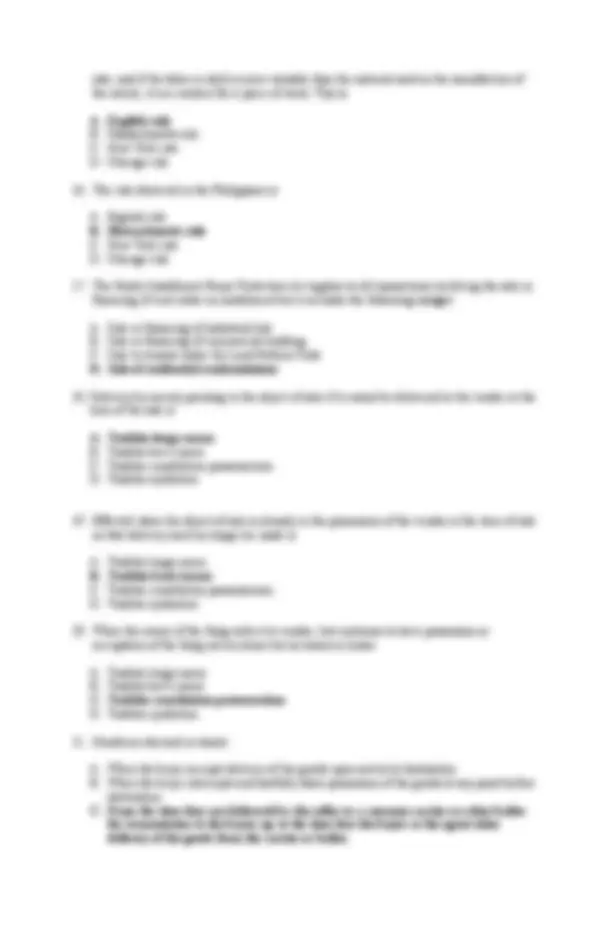
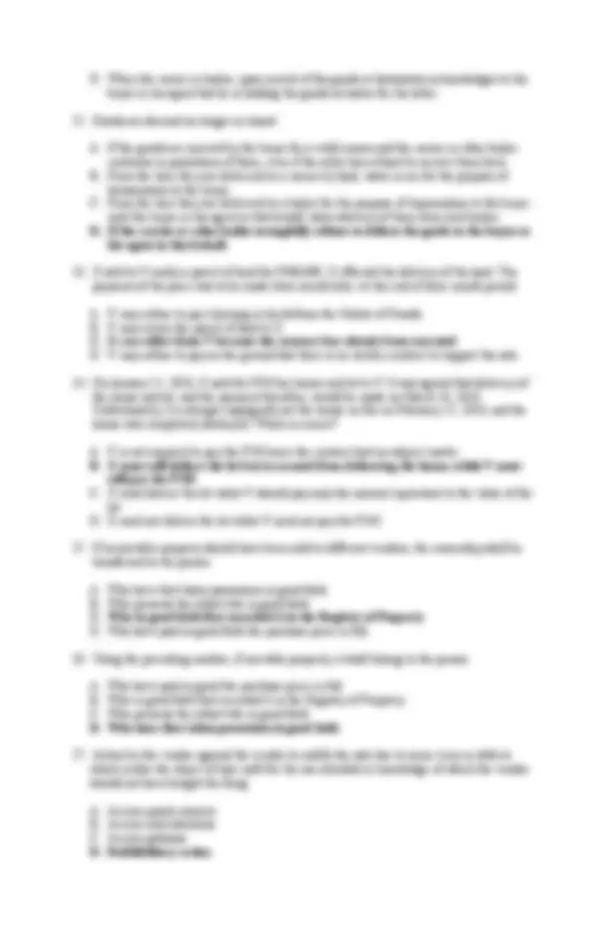
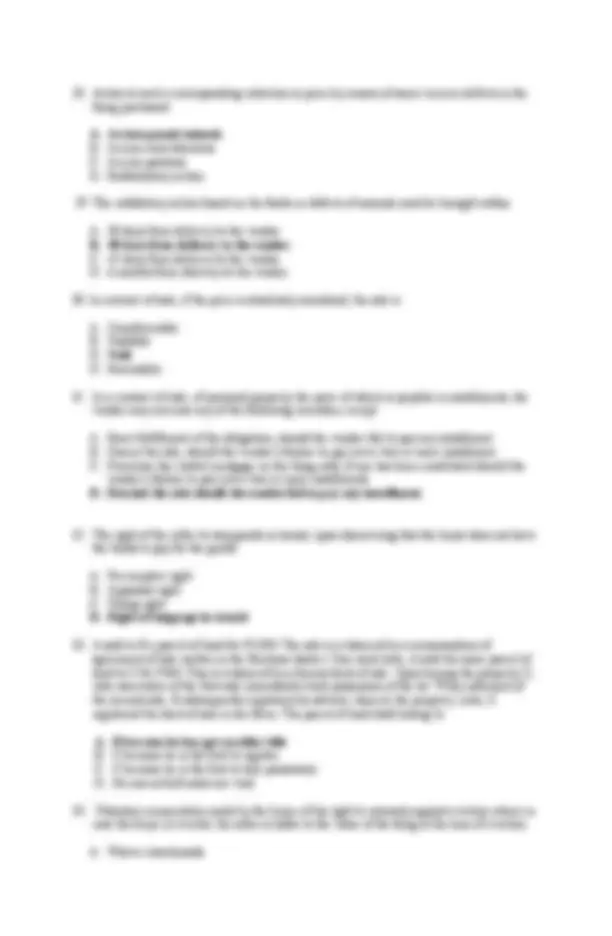
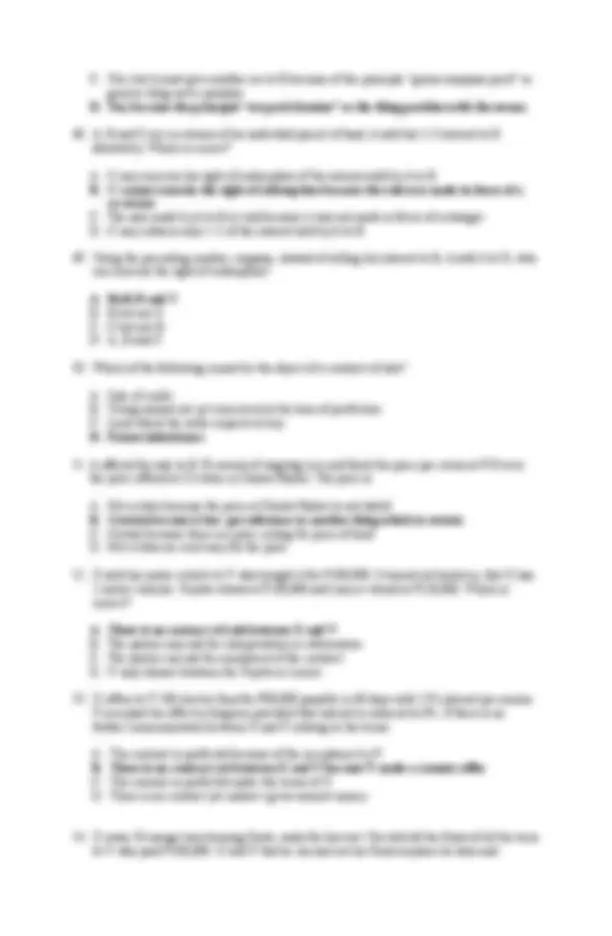
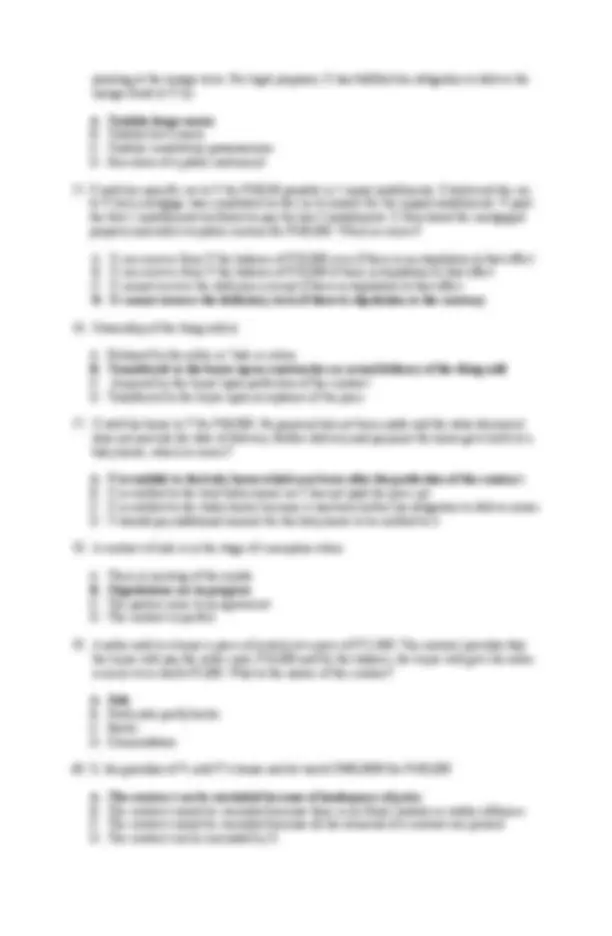
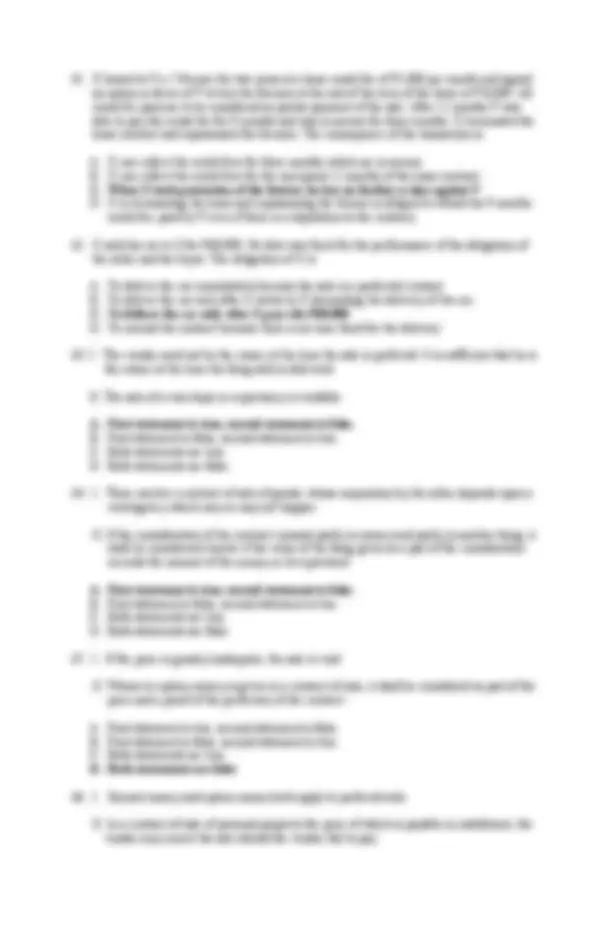
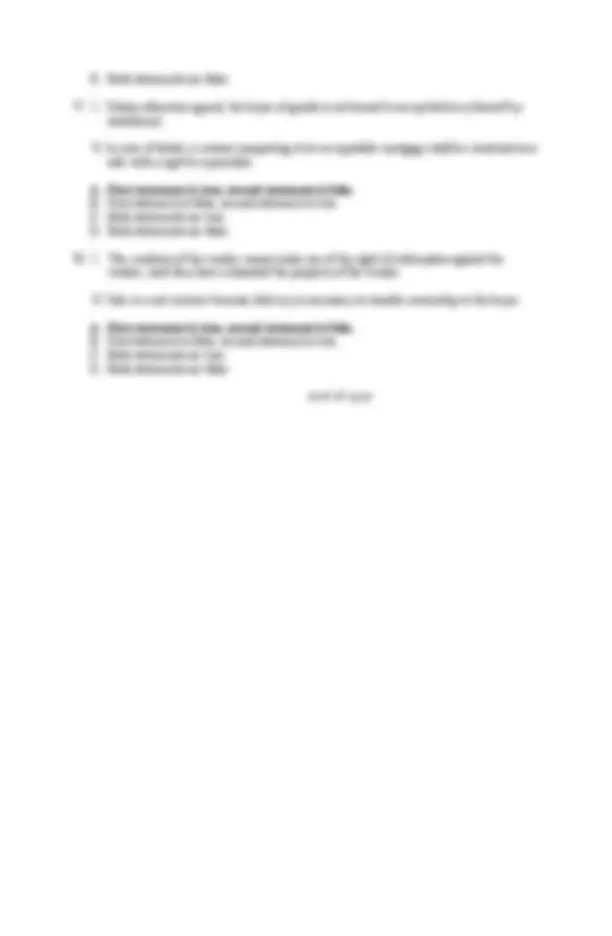


Study with the several resources on Docsity

Earn points by helping other students or get them with a premium plan


Prepare for your exams
Study with the several resources on Docsity

Earn points to download
Earn points by helping other students or get them with a premium plan
Community
Ask the community for help and clear up your study doubts
Discover the best universities in your country according to Docsity users
Free resources
Download our free guides on studying techniques, anxiety management strategies, and thesis advice from Docsity tutors
About kaw on sales ajsjjagsnsbgxkabsskbsgsksbsgksbsgxosbsgxijsvsnxjxgsjdidgjd
Typology: Exercises
1 / 13

This page cannot be seen from the preview
Don't miss anything!








CPAR
QUIZ- Business Law and Taxation
A. Between a minor and a capacitated person. B. Between two insane persons who did not act during lucid interval C. Between first degree cousins D. Between husband and wife
A. X has got a voidable title because at the time of sale, she is a minor B. X can ask for rescission of the sale to Y because she suffered a lesion of more than ¼ of the value of the property. C. If Y is in bad faith, Y becomes the owner of the necklace upon delivery to him but his title is voidable. D. X can ask for the annulment of the sale to Y because at the time of sale she is a minor.
A. Dacion en pago B. Option money C. Delivery D. Arras
4.A contract of sale is not a(an)
A. Onerous contract B. Accessory contract C. Commutative contract D. Bilateral contract
5.Warranty against hidden defects is
A. An essential element B. A natural element C. An accidental element D. An artificial element
A. Valid B. Voidable C. Unenforceable D. Void
A. Dacion en pago B. Payment by cession C. Emptiospei
D. Emptio rei-speratae
A. Dacion en pago B. Payment by cession C. Emptio spei D. Emptio rei-speratae
A. Things subject to a resolutory condition may be the object of the contract of sale. B. A thing is generic when it is particularly designated or physically segregated from all others of the same class. C. Things having a potential existence may be the object of the contract of sale. D. The sole owner of a thing may sell an undivided interest therein
A. Both are contracts of sale B. Both are contracts for a piece of work C. First is a contract of sale second is a contract for a piece of work D. First is a contract for a piece of work, second is a contract of sale
A. DD may compel V to accept the P12,000,000 first offered. B. V may compel DD to pay P15,000, C. V and DD should shoulder the P3,000,000 difference D. DD cannot compel V to accept the P12,000,000 first offered
A. English rule B. Massachusetts rule C. New York rule D. Chicago rule
A. English rule B. Massachusetts rule C. New York rule D. Chicago rule
D. When the carrier or bailee, upon arrival of the goods at destination acknowledges to the buyer or his agent that he is holding the goods as bailee for the latter.
A. If the goods are rejected by the buyer for a valid reason and the carrier or other bailee continues in possession of them, even if the seller has refused to receive them back. B. From the time they are delivered to a carrier by land, water or air for the purpose of transmission to the buyer. C. From the time they are delivered to a bailee for the purpose of transmission to the buyer until the buyer or his agent in that behalf, takes delivery of them from such bailee. D. If the carrier or other bailee wrongfully refuses to deliver the goods to the buyer or his agent in that behalf.
A. V may refuse to pay claiming in his defense the Statute of Frauds B. V may return the parcel of land to X C. X can collect from V because the contract has already been executed D. V may refuse to pay on the ground that there is no written contract to support the sale.
A. V is not required to pay the P2M since the contract had no subject matter. B. X must still deliver the lot but is excused from delivering the house, while V must still pay the P2M C. X must deliver the lot while V should pay only the amount equivalent to the value of the lot. D. X need not deliver the lot while V need not pay the P2M
A. Who have first taken possession in good faith B. Who presents the oldest title in good faith C. Who in good faith first recorded it in the Registry of Property D. Who have paid in good faith the purchase price in full
A. Who have paid in good the purchase price in full B. Who in good faith first recorded it in the Registry of Property C. Who presents the oldest title in good faith D. Who have first taken possession in good faith
A. Accion quanti minoris B. Accion reinvidicatoria C. Accion pauliana D. Redhibilitory action
A. Accion quanti minoris B. Accion reinvidicatoria C. Accion pauliana D. Redhibilitory action
A. 30 days from delivery to the vendee B. 40 days from delivery to the vendee C. 45 days from delivery to the vendee D. 6 months from delivery to the vendee
A. Unenforceable B. Voidable C. Void D. Rescissible
A. Exact fulfillment of the obligation, should the vendee fail to pay any installment B. Cancel the sale, should the vendee’s failure to pay cover two or more installment C. Foreclose the chattel mortgage on the thing sold, if one has been constituted should the vendee’s failure to pay cover two or more installments D. Rescind the sale should the vendee fail to pay any installment.
A. Pre-emptive right B. Appraisal right C. Voting right D. Right of stoppage in transit
A. B because he has got an older title B. C because he is the first to register C. C because he is the first to take possession D. No one as both sales are void
A. Waiver intentionada
A. C cannot be considered as the owner because the original seller (X) is not the real owner. B. P may recover the fountain pen from C without reimbursement because he is the legal owner. C. C became the owner because he purchased the pen from a merchant store D. C became the owner regardless of whether the seller is a store for pens or not because C bought it in good faith.
A. Upon perfection of the contract B. Upon acceptance by the buyer of the offer of the seller C. Upon expiration of seven days D. Upon delivery of the goods
A. Traditio longa manu B. Traditio brevi manu C. Traditio constitutum possessorium D. Execution of a public instrument
A. Vi is liable to the vendees for any hidden defects even though he is not aware. B. Vi is not liable because he is in good faith C. Vi is not liable under the principle of “caveat emptor” or let the buyer beware D. The vendees may hold the manufacturer liable but not Vi because Vi specifically asked for 220 volts
A. Expenses of the contract B. Interest on the price of the sale C. Necessary expenses on the thing sold D. Price of the sale
A. The goods must be in transit B. The buyer must be insolvent C. The seller must be in possession of the goods D. The seller must be unpaid
A. No, because the car was lost through fortuitous event and without B’s fault, hence B’s obligation is extinguished. B. No, because the loss should be borne by the seller as this an installment sale so until the buyer pays the full amount of the price of the sale, A remains to be the owner.
C. Yes, but A must give another car to B because of the principle “genus nunquam perit” or generic thing never perishes D. Yes, because the principle “res perit domino” or the thing perishes with the owner.
A. C may exercise his right of redemption of the interest sold by A to B B. C cannot exercise the right of redemption because the sale was made in favor of a co-owner C. The sale made by A to B is void because it was not made in favor of a stranger D. C may redeem only 1 /2 of the interest sold by A to B
A. Both B and C B. B but not C C. C but not B D. A, B and C
A. Sale of credit B. Young animal not yet conceived at the time of perfection C. Land which the seller expects to buy D. Future inheritance
A. Not certain because the price at Cainta Market is not stated B. Certain because it has got reference to another thing which is certain C. Certain because there is a price ceiling for price of land D. Not certain so court may fix the price
A. There is no contract of sale between X and V B. The parties may ask for interpretation or reformation C. The parties can ask for annulment of the contract D. V may choose between the Toyota or Lancer
A. The contract is perfected because of the acceptance by V B. There is no contract yet between X and V because V made a counter offer C. The contract is perfected under the terms of X D. There is no contract yet unless v gives earnest money
A. X can collect the rental fees for three months which are in arrears. B. X can collect the rental fees for the unexpired 12 months of the lease contract. C. When X took possession of the freezer, he has no further action against V D. X in terminating the lease and repossessing the freezer is obliged to refund the 9 months rental fee, paid by V even if there is a stipulation to the contrary.
A. To deliver the car immediately because the sale is a perfected contract B. To deliver the car only after Z writes to X demanding the delivery of the car. C. To deliver the car only after Z pays the P60, D. To rescind the contract because there is no time fixed for the delivery
II. The sale of a vain hope or expectancy is voidable.
A. First statement is true, second statement is false. B. First statement is false, second statement is true. C. Both statements are true. D. Both statements are false.
II. If the consideration of the contract consists partly in money and partly in another thing, it shall be considered a barter if the value of the thing given as a part of the consideration exceeds the amount of the money or its equivalent.
A. First statement is true, second statement is false. B. First statement is false, second statement is true. C. Both statements are true. D. Both statements are false
II. Whenever option money is given in a contract of sale, it shall be considered as part of the price and a proof of the perfection of the contract.
A. First statement is true, second statement is false. B. First statement is false, second statement is true. C. Both statements are true. D. Both statements are false
II. In a contract of sale of personal property the price of which is payable in installment, the vendor may cancel the sale should the vendee fail to pay.
A. First statement is true, second statement is false. B. First statement is false, second statement is true. C. Both statements are true. D. Both statements are false
II. Sale is a consensual contract, therefore delivery or payment is not essential for perfection.
A. First statement is true, second statement is false. B. First statement is false, second statement is true. C. Both statements are true. D. Both statements are false
II. An unaccepted unilateral promise to buy or to sell a determinate thing for a price certain is binding upon the promissory.
A. First statement is true, second statement is false. B. First statement is false, second statement is true. C. Both statements are true. D. Both statements are false
II. The sale of a piece of land or interest therein when made thru an agent is void unless the agent’s authority is in writing even if the sale itself is in s public instrument and has been registered.
A. First statement is true, second statement is false. B. First statement is false, second statement is true. C. Both statements are true. D. Both statements are false
II. If the same thing should have been sold to different vendees the ownership shall be transferred to the person who may have taken possession thereof in good faith.
A. First statement is true, second statement is false. B. First statement is false, second statement is true. C. Both statements are true. D. Both statements are false
II. The vendor is responsible to the vendee for any hidden faults or defects in the thing sold only if he was aware thereof.
A. First statement is true, second statement is false.
D. Both statements are false
II. In case of doubt, a contract purporting to be an equitable mortgage shall be construed as a sale with a right to repurchase.
A. First statement is true, second statement is false. B. First statement is false, second statement is true. C. Both statements are true. D. Both statements are false
II. Sale is a real contract because delivery is necessary to transfer ownership to the buyer.
A. First statement is true, second statement is false. B. First statement is false, second statement is true. C. Both statements are true. D. Both statements are false
-end of quiz-